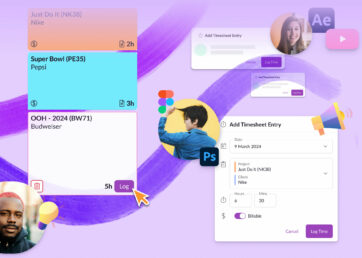The agency industry is a crowded space, so when you ask yourself how to scale your agency, it’s not always clear where (or how) to get started. Keep this in mind: scaling is a journey, and it requires careful planning, flexibility, and a willingness to learn from both successes and failures.
We know that scaling an agency can be a tough task, so we’re here to provide practical advice.
In this article 📖
How to scale your agency: Understanding the basics of scalability
“Scalability” is a word that gets thrown around a lot—particularly within the tech sector. But any type of business can set itself up for scalability.
Scaling a business refers to growing and expanding its operations in a way that allows it to handle increased demand, generate more revenue, and maintain (or improve) profitability.
Scaling goes beyond growth as it involves increasing the capacity and capabilities of the business to handle greater volumes of customers, transactions, or operations.
So what exactly does this mean when you want to scale your agency?
Understanding agency scalability
For agencies, scalability means managing more clients, offering an expanded range of services, or venturing into new markets. All without incurring soaring costs or compromising service quality. It requires careful balance and an astute understanding of agency efficiency.
When addressing scalability for agencies, we focus on designing and adjusting methodologies, agency project management processes, and operations to enable the agency to scale effectively.
But scalability can’t happen without any of the following:
- A clear business strategy
- A strong leadership team
- An infrastructure that enables scalability
- Standardized agency workflows
- A scalable revenue model
Before we move on, it’s important to understand the difference between growth and scaling.
Growth vs. scaling: The distinction
This is where it’s easy to stumble. Growth and scaling connect, but they’re not identical. If it’s time to scale your agency, grasping these two concepts is essential.
Growing: Growing a business refers to the process of increasing its size, revenue, or market presence over time. It’s about incremental progress and may involve increasing resources, workforce, or product and service offerings to meet the demands of a growing customer base.
Scaling: Scaling a business involves increasing its revenue and profitability at a rapid rate while maintaining or improving operational efficiency. The goal is to create a business model that can handle exponential growth without proportional increases in costs.
While growth is simpler (and can just happen organically), scaling demands strategic thinking, continuous tweaking, and a profound understanding of your clients and agency processes.
Scale your agency: 6 steps to get started
Scaling an agency isn’t easy. But with the right strategy in place and armed with actionable tactics, you’ll be ready to start the journey and scale successfully.
While each agency is unique and will have unique needs for scaling, these steps apply to everyone.
1. Create a clear agency strategy
If you don’t know where you’re going, how will you get there? Every business needs a clear and compelling business strategy that provides direction for the company and its employees.
Your agency strategy should outline:
- Goals and objectives
- Target market
- Unique value proposition (USP)
- Opportunity assessment
Your strategy will serve as your roadmap for scaling and guide decision-making throughout the journey. But remember, a strategy shouldn’t be set in stone. It needs to be evaluated and adjusted as the market changes and client needs evolve.
2. Define clear goals and objectives
If you’re thinking about how to scale your agency, it all starts with identifying what success looks like. This is what will inform both your strategy and tactics.
You’ll need to set clear and specific goals for scaling, whether those are:
- Revenue targets
- Market share expansion
- Client acquisition goals
Setting goals starts with looking at how your agency has grown so far. Identify your biggest opportunities, define your ideal clients, and then set clear, measurable goals.
Ultimately, the objectives you set will guide your scaling efforts and provide a framework for decision-making going forward.
- Strategy refers to the overarching plan or approach designed to achieve a long-term goal or objective.
- Tactics are the specific actions taken to execute the strategy and achieve the desired outcomes.
3. Evaluate and optimize your current operations
Your agency’s operational infrastructure has to support scaling. Assess your agency’s current operations, workflows, and project management processes.
You’ll want to:
- Identify areas of inefficiency
- Uncover bottlenecks
- Tackle resource constraints
- Streamline operations
- Eliminate unnecessary steps
- Improve productivity
You need to ensure that your existing operations are optimized for scale before ramping up, not when you’re in the thick of it.
4. Identify and address resource needs
Scaling your agency is all about resources. You’ll want to put your best team on evaluating your agency’s resource requirements to meet increased demand.
Consider factors such as:
- Team and talent
- Tools and tech stack
- Financial resources
Ask yourself if additional employees, skills, or technology investments are necessary to support scaling.
Lastly, without a comprehensive resource management plan in place, scaling your agency won’t be possible.
You might also be interested in:
The #1 mistake you’re making with your resource management plan
5. Develop scalable systems and processes
You can’t scale your agency without implementing systems and processes that can handle increased volumes and complexity.
Invest in:
- Technology platforms
- Project management tools
- Resource management software
- Client management tools
Standardize processes and documentation to ensure consistency and facilitate the onboarding of new team members.
6. Hire and develop the right talent
Sure we’ve entered the age of AI and project managers everywhere are using ChatGPT. But without the right team (of humans)—you won’t get far in your scaling journey.
To ensure your team can effectively support the agency’s scaling efforts, you’ll need to:
- Think about your overarching agency team structure
- Identify key roles and positions that needed to support growth
- Develop a talent acquisition strategy
- Implement effective onboarding processes
- Invest in ongoing professional development to retain talent
Remember, just because your agency is on a mission to scale, it doesn’t give you the right to over-work your employees. That’s why work-life balance should always be factored into workload planning. After all, agency burnout is still a very real issue even though we know that happy people make for great work.
How to scale a creative agency
Scaling is about setting your creative agency up for long-term success. That might just come down to two (not so) simple things:
- Focus on positioning: Your agency’s positioning is key to attracting clients and standing out from competing creative agencies. Here, you should focus on the market and client needs instead of simply pushing the agency’s perspective. The goal? Creating a consistent, differentiated claim that resonates with your target audience.
- Live your values: Positioning and values shouldn’t just be written on a website. They should shape your agency’s identity and help differentiate you from competitors. When you authentically live your values, it becomes a part of your brand story. In a world full of noise, clients are increasingly seeking creative agencies that align with their own values. So showcasing your values can attract like-minded clients and result in lasting client relationships.
Last year, creative agency Mother London, won 23 new clients, proving that its mission-led approach is a key differentiating factor. Plus, while many other agencies laid off staff, they ended up hiring 5% more employees.
Katie Mackay-Sinclair, Partner at Mother, told Ad Age that “Our values make us feel like a [client] partner that will be with them through ups and downs, that we will really care about the people in their business and their customers versus just what we want out of work.”
The lesson? Never underestimate positioning. Because living your values sure can pay off.
How to scale a marketing agency
There’s an abundance of marketing and digital marketing agencies out there. So if you’re wondering how to scale your marketing agency, you’re probably not alone.
But the most important thing you can do is this: choose a niche.
While this can be said for any business, it’s particularly important when looking at how to scale a digital marketing agency—there’s simply too much competition out there.
So where do you start?
- Review your existing customer base: Take a look at your best customers (most valuable accounts) and see if you can identify any patterns. What type of customers are they? Which marketing services do they buy from you? What type of feedback do they give you? What does your relationship with them look like? All of this can inform your direction.
- Assemble the right team: Your team is critical when considering how to scale a digital agency. Once you have identified a niche that makes sense not just for your agency values, but in terms of market opportunities and direction, you’ll need a team that can bring that vision to life.
With a niche chosen based on both client insights and data, backed by a team of experienced professionals, your marketing agency has already won half the battle. Now you’re ready to start branding yourself as an expert in your chosen field, separating yourself from the competition.
How to scale a social media marketing agency
Last year, social media publishing platform Hootsuite’s Social Media Trends 2023 report, predicted that social media budgets would escape the looming recession. The reason, of course, is that brands are looking for new (more cost-effective) ways to stay connected with their audience.
This was good news for social media marketing agencies. So with seemingly unaffected budgets, how can social media agencies win those accounts as they scale?
The answer is this: keep it simple.
Social media is a fast-moving field, with new trends, metrics, and even platforms (hello, Threads!) cropping up more often than we can handle. Your clients don’t have time to keep up with it all, that’s why they’re hiring an agency.
It’s your job to make that choice easy.
- Productize your offerings: Turn your service-oriented tasks into specific products or packages. When clients ask about your services, give them customized packages. Tailor them to their specific needs, budget, and desired outcomes. It’ll create standard operating processes that provide clarity for clients.
- Invest in your own social media channels: There’s no better way to prove your value than to put your money where your mouth is. In this case, that means making sure your own social media channels are up to par. There’s no better place to showcase your capabilities and creativity, and similar to your client’s, it could be a cost-effective way of winning new business.
Why scaling agencies is different from other businesses
Scaling an agency is a unique challenge. But it’s not just about increasing numbers, but rather, understanding and navigating specific elements intrinsic to your agency’s business model.
This is why scaling agencies is challenging:
- Variable workloads: Agencies often deal with fluctuating workloads, making resource management crucial for growth. Proper resource allocation, project scheduling, and utilization help ensure efficiency and productivity, even as the agency scales.
- Service-based business: Agencies offer services instead of tangible products. This means scaling requires prioritizing experience, skills, and resources. It involves hiring and educating skilled professionals that are capable of maintaining high-quality standards and managing relationships with clients while putting out killer creative work.
- Client acquisition and retention: Unlike businesses selling physical products, agencies rely heavily on acquiring and maintaining clients for growth. Because of this, effective marketing strategies, robust networking, and a solid industry reputation are crucial to attract and retain high-value clients.
- Project-based work: Agencies often operate on a project basis. They tackle specific client assignments or campaigns. Scaling means managing projects and meeting deadlines while maintaining quality standards. Efficient project management, resource allocation, and effective collaboration are crucial elements.
- Talent acquisition and retention: The success of any agency hinges on its team. Attracting and retaining top talents with specialized skills in areas like creative design, copywriting, strategy, or account management is key to scaling.
- Constant innovation: Given the rapid evolution of the advertising and marketing landscape, agencies have to stay ahead. This involves embracing new technologies, trends, and strategies. Scaling agencies need to invest in education, research, and development to offer competitive services.
7 challenges in agency scaling (and how to overcome them)
Scaling means you have to juggle the challenges imposed by our current economic climate. For instance, in recent years, agencies have had to improve how they manage remote work. Navigating these obstacles is essential for agencies aiming to achieve sustainable growth.
Let’s explore key challenges and potential strategies to overcome them:
1. Challenge: Establishing a suitable pricing structure
Solution: Consider value-based pricing, building a compelling value proposition rooted in market research and competitive analysis. Alternatively, explore cost-based pricing, optimizing processes, and leveraging outsourcing to compete on price.
2. Challenge: Building a resilient client pipeline
Solution: Develop a diverse and consistent client pipeline across different sectors and scales. Implement a comprehensive marketing strategy encompassing SEO, content marketing, social media, and targeted outreach. Forming strategic alliances with other agencies can also broaden your network.
3. Challenge: Maintaining quality when scaling
Solution: Implement stringent quality assurance processes, invest in team training, and employ specialists for specific tasks to ensure quality remains high while handling a growing client base.
4. Challenge: Managing resources effectively
Solution: As your team grows and projects multiply, resource allocation becomes critical. Effective resource management can help ensure that the right resources are assigned to the right tasks, keeping your projects on track and your team productive.
Tackling these challenges head-on and employing effective strategies can overcome obstacles. It’s an ongoing process of learning and adapting, so find what works best for your agency and clients.
5. Challenge: Retaining existing clients
Solution: Offer flexible solutions like discounts, plan downgrades, or extra value. Track expiring subscriptions, launch targeted campaigns, and devise strategies to reduce failed payments to retain customers during challenging times.
6. Challenge: Streamlining onboarding
Solution: Provide a smooth onboarding experience with integrated client portals that allow clients to manage orders, access services, and submit tickets. Customizable solutions carrying your agency’s branding can enhance the onboarding process.
7. Challenge: Adapting to market shifts
Solution: Foster a culture of continuous learning, stay in tune with industry shifts, and invest in lifelong learning. Incorporate research and development into your business strategy and stay updated with industry trends through events, webinars, and publications,
Scaling isn’t easy (and that’s fine)
Taking your agency to the next level involves more than just ambition—it requires strategic planning, commitment to sustainable growth, and effective resource management.
Now, that’s not easy. And it doesn’t happen overnight either.
But if you’re willing to do the work, you’ll reap the rewards. Soon enough, you’ll be able to take on better-fit clients, deliver results faster, and share the successes with your employees.
Embrace the journey.






